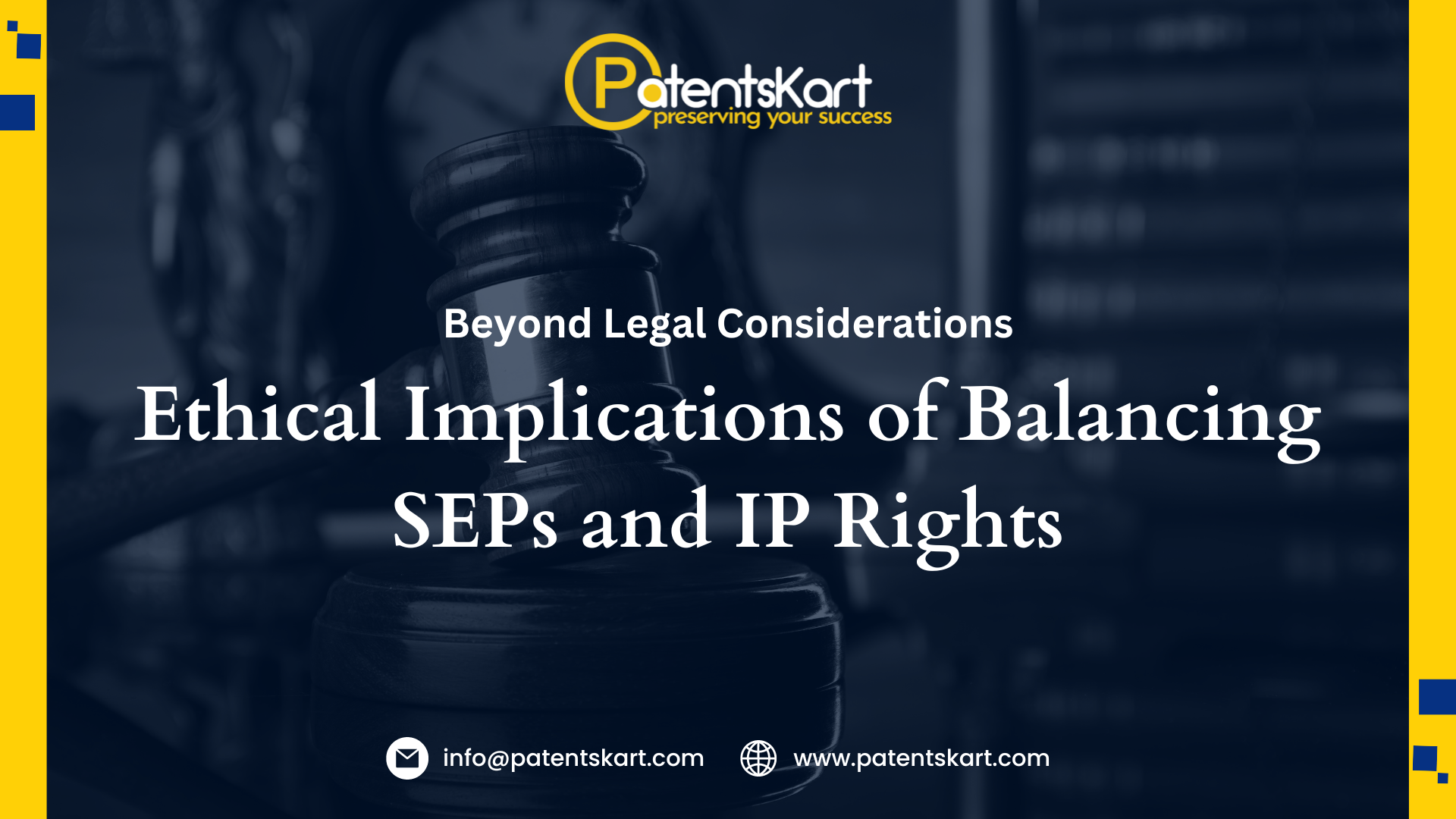It is impossible to exaggerate the significance of intellectual property (IP) rights in today’s technologically advanced and increasingly interconnected society. IP rights are the cornerstone of innovation and economic expansion because they enable artists and innovators to safeguard their concepts and profit from their labors. The advent of Standard-Essential Patents (SEPs) has nevertheless raised a complicated ethical quandary that goes beyond legal issues: how to balance IP rights and SEPs. This essay explores the ethical implications of this problem, highlighting the difficulties and potential remedies in navigating this complex environment.
Knowledge of SEPs and IP Rights
Understanding SEPs and IP rights is essential before delving into the ethical ramifications. Patents that cover the technology required to adhere to industry standards are referred to as standard-essential patents. These patents are essential for maintaining compatibility and interoperability between diverse systems and products. Contrarily, IP rights cover a wide range of legal safeguards, including trade secrets, copyrights, trademarks, and patents, which give authors and inventors of original works exclusive rights.
Innovation vs. accessibility ethical dilemma
The conflict between innovation and accessibility is one of the main moral conundrums involving the balance between SEPs and IP rights. On the one hand, rigorous IP rights enforcement can discourage competition and impede technological advancement. This is especially important in industries like telecommunications and information technology where standardization is essential. Exorbitant licensing costs for SEPs may make it difficult for new competitors to enter the market, reducing competition and stifling innovation.
On the other hand, those who create and invent things deserve to profit from their labors and investments in knowledge. IP protection and incentives are essential for promoting innovation. Patents that grant exclusive rights encourage innovators to spread their ideas because they know they will be compensated for their contributions. In terms of ethics, it’s critical to uphold the rights of creators and safeguard their interests because doing so encourages further invention.
Putting Private Gain and Public Interest in Balance
The difficult balance between public interest and private gain is another aspect of ethics to take into account. While intellectual property rights let creators profit from their discoveries, they also run the risk of encouraging monopolistic behavior. This may lead to increased costs, restricted access to essential technologies, and a general slowdown in societal advancement. It becomes crucially ethical to strike a balance between the public interest, which demands widespread access to fundamental technology, and the requirement to honor inventors for their achievements.
Fair, Reasonable, and Non-Discriminatory (FRAND) licensing guidelines for SEPs have been adopted by many organizations and standards bodies to address this issue. These guidelines seek to balance the interests of patent holders with those of the larger community. FRAND licenses guarantee that SEPs are licensed under fair and non-discriminatory conditions, fostering innovation, competition, and accessibility. Organizations can manage the moral difficulties presented by SEPs and IP rights by abiding by these guidelines. Check out our blog What role does FRAND play in standard essential patent licensing?
Collaboration and Moral Licencing Practises Promotion
Fostering collaboration and moral licensing practices is essential for managing the ethical issues of balancing SEPs and IP rights. Establishing just and open licensing frameworks requires cooperation amongst industry players, including patent owners, standards organizations, and technology implementers. Encouragement of discussion and dialogue can aid in conflict resolution, stop anticompetitive behavior, and promote a climate that is open to innovation.
Furthermore, establishing unambiguous moral standards for SEP licensing can give patent owners and technology developers a guide. These regulations might take into account factors like cost, accessibility, and the long-term effects of licensing decisions on society. Putting ethical licensing practices into practice encourages a just and equitable approach, ensuring that the advantages of innovation are shared more widely and advancing the general welfare of society.
Governments and regulatory agencies also have a big impact on the moral climate around SEPs and IP rights. They can set up rules and procedures that encourage moral conduct and forbid anticompetitive behavior. Governments can help to create a more moral and balanced environment by actively promoting fair competition, encouraging the licensing of SEPs under FRAND terms, and keeping an eye on compliance.
Conclusion
Beyond legal issues, the ethical ramifications of balancing SEPs and IP rights necessitate a careful evaluation of the wider societal impact. Even though IP rights are crucial for encouraging innovation and rewarding creators, the prevalence of SEPs might pose problems concerning accessibility, competition, and justice. A complex strategy that encourages cooperation, moral licensing procedures, and government involvement when required is needed to strike the correct balance.
It is imperative to address these ethical issues if we want to make sure that everyone benefits from technology breakthroughs and that no one is unfairly denied access to necessary technologies. We can find a balance that encourages both innovation and accessibility while navigating this complicated landscape with an emphasis on fairness, openness, and the public interest. This will help to create a more just and sustainable future. Get the best patent support services at PatentsKart.
Also Read: Are All Standard Essential Patents (SEPs) Actually Essential?


1 comment
Very nice post. I just stumbled upon your blog and wanted to say that I have really enjoyed surfing around your blog posts.
In any case I will be subscribing to your feed and I hope
you write again soon!